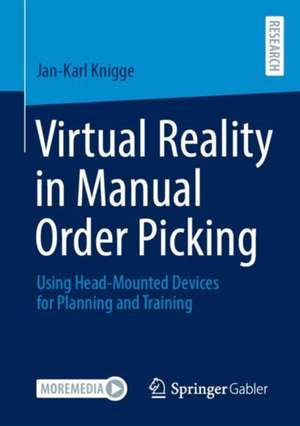Virtual Reality in Manual Order Picking: Using Head-Mounted Devices for Planning and Training
Autor Jan-Karl Kniggeen Limba Engleză Paperback – 31 aug 2021
Preț: 579.52 lei
Preț vechi: 681.79 lei
-15% Nou
Puncte Express: 869
Preț estimativ în valută:
110.89€ • 115.78$ • 91.78£
110.89€ • 115.78$ • 91.78£
Carte tipărită la comandă
Livrare economică 04-18 aprilie
Preluare comenzi: 021 569.72.76
Specificații
ISBN-13: 9783658347031
ISBN-10: 3658347031
Pagini: 216
Ilustrații: XXIV, 216 p. 94 illus.
Dimensiuni: 148 x 210 mm
Greutate: 0.3 kg
Ediția:1st ed. 2021
Editura: Springer Fachmedien Wiesbaden
Colecția Springer Gabler
Locul publicării:Wiesbaden, Germany
ISBN-10: 3658347031
Pagini: 216
Ilustrații: XXIV, 216 p. 94 illus.
Dimensiuni: 148 x 210 mm
Greutate: 0.3 kg
Ediția:1st ed. 2021
Editura: Springer Fachmedien Wiesbaden
Colecția Springer Gabler
Locul publicării:Wiesbaden, Germany
Cuprins
1 Introduction.- 2 Theoretical background: The use of virtual reality head-mounted devices for planning and training in the context of manual order picking.- 3 Systematic literature review of previous studies that use virtual reality head-mounted devices for simulating manual activities.- 4 Experimental design for evaluating the usability of virtual reality for planning and training in the context of manual order picking and execution of the study.- 5 Results of the comparison between virtual and real order picking.- 6 Analysis of learning curves in virtual and real order picking.- 7 Conclusion.
Notă biografică
Jan-Karl Knigge completed his doctorate as a research associate at the chair of Management and Logistics at Technical University of Darmstadt. His research focused on the usability of virtual reality technology for the human-centred planning of manual order picking systems. Furthermore, he used experimental studies to investigate the effect of learning in VR in the context of manual order picking.
Textul de pe ultima copertă
The introduction of consumer-level head-mounted devices (HMDs) has led to a major drop in the application costs of virtual reality (VR), making the technology available for a wide range of users. To understand if VR HMDs can be used for planning and training in the context of manual order picking, this thesis provides the results of a large-scale randomized controlled study in which order picking has been compared between a virtual and a real environment. The results imply that VR HMDs can indeed be used by manufacturers and warehouse operators in a rack planning process if the reduction of searching times or the perceived workload is in focus. Additionally, the findings enable the use of VR HMDs for scientific research on human-centred rack design. Finally, the thesis highlights the usability of VR HMDs for training manual order picking activities.
About the Author
Jan-Karl Knigge completed his doctorate as a research associate at the chair of Management and Logistics at Technical University of Darmstadt. His research focused on the usability of virtual reality technology for the human-centred planning of manual order picking systems. Furthermore, he used experimental studies to investigate the effect of learning in VR in the context of manual order picking.
